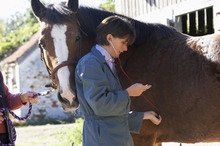According to the Maryland Department of Agriculture, a horse stabled in Montgomery County has tested positive for the mutant neurotropic form of Equine Herpes Virus (EHV-1) and is being treated by a private veterinarian.

Veterinarian checking horse's health
According to the Maryland Department of Agriculture, a horse stabled in Montgomery County has tested positive for the mutant neurotropic form of Equine Herpes Virus.
The horse had been outside Montgomery County for breeding for more than two weeks before returning home on Monday.
The horse began showing mild respiratory and neurological signs on Tuesday and was seen by a private veterinarian, who reported the suspected neurological illness to the Maryland Department of Agriculture (MDA), as is required by law. Laboratory tests conducted by MDA confirmed the diagnosis. The horseâs condition is improving.
Other horses at the farm are now being tested as are horses that were in contact with the ill horse at the breeding facility. Those results will not be available until tomorrow. Both farms are presently under a 28-day investigational hold while MDA inspectors perform epidemiological and infectious disease testing.
Stables near the one where the sick horse resides have been notified of the situation and owners cautioned to monitor horses at their premises carefully. The disease is easily spread and typically has an incubation period between 2-10 days. Respiratory shedding of the virus occurs for 7-10 days, but may last longer in infected horses.
MDAâs Animal Health Program is monitoring the situation closely. Owners should contact their private veterinarians to arrange for EVH testing if a horse exhibits significant temperature elevations or neurologic signs. Veterinarians are required to report equine neurologic syndrome to MDA.
Horses suspected of having EHV infections should be examined by a veterinarian and tested for virus shedding. Infected horses should be isolated immediately and all contact with other horses should be avoided. Exposed horses should also be isolated.
Biosecurity measures include doing everything possible to reduce the chances of an infectious disease being carried onto your property by people, animals, equipment, or vehicles, either accidentally or on purpose. Anything that touches an infected horse and secretions shed by sick horses have the potential to transfer pathogens to other horses.
The immediate separation and isolation of identified suspect cases is key to disease control. Ideally, a person caring for a sick horse should not also work with or be around healthy horses. If this is impractical, it is recommended that healthy horses should be worked with first and sick horses last.
Wearing disposable gloves and changing them between horses or the use of hand sanitizers between horse contacts are alternative recommendations. Thorough cleaning and disinfection of foot wear between entry into barns and stalls can also minimize risks of disease spread.
Herpes viruses are susceptible to many disinfectants, including a 1:10 dilution of bleach in water. Both alcohol and bleach disinfectants are inactivated by organic matter, so all soil and manure should be cleaned away before using these products. Soap and detergent can be used effectively before applying a disinfectant.
